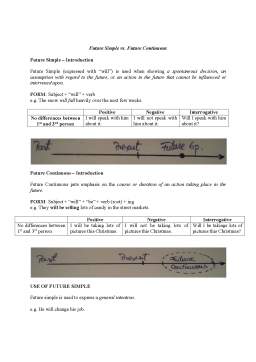Extras din curs
Future Perfect Simple expresses an action that will start at an earlier time in the future and will be completed at a later time in the future (see ‘moment of reference’ in the timeline).
Positive Negative Interrogative
No differences between 1st and 3rd person He will have spoken to the manager by then. We will not have spoken to the manager by then. Will he have spoken to the manager by then?
FORM
Regular verbs: Subject + “will” + aux. vb. “have” + vb (root) + “ed. Irregular verbs: Subject + will + aux vb “have” + vb (root) + 3rd column from the list of irregular verbs.
e.g. By 6 o’clock, I will have finished decorating the table. e.g. After my approximations, by the age of 30, I will have read all the books in my personal collection.
USE OF FUTURE PERFECT SIMPLE
We use the future perfect simple tense for actions that will be completed before or at a certain time in the future (see “moment on reference” on the timeline).
It is often used with a time expression beginning with “by”: by then, by that time, by midnight, by the end of the year etc.
On the other hand, you must be careful with other time expressions because this tense CANNOT be used in time clauses with expressions such as: when, while, before, after, as soon as etc, which are normally used in time clauses with other tenses.
The expression of time can also be interpreted from using other time expressions or actions such as: “on Sunday”, “before June 30th”.
e.g. I will have sent the project by Friday.
On August 11th this year, we will have been married for five years.
How long will she have worked there by the end of this year?
In all these examples the actions will become part of the past at a given time.
Future Perfect Continuous – Introduction
Future Perfect Continuous puts emphasis on the course or duration of an action taking place before a certain time in the future. It can also be used to express an assumption regarding a future action.
OBS: This tense is not used very often, as it can usually be replaced with the future perfect simple.
FORM: Subject + “will” + aux vb. “have” + been + vb (root) + ing
Positive Negative Interrogative
No differences He will have been touring around the city, in search for food. He will not have been touring around the city, in search for food. Will he have been touring around the city in search for food?
USE OF FUTURE PERFECT CONTINUOUS
We employ the Future Perfect Continuous for actions that will continue until a certain point of time in the future and will remain incompleted. It is also normally used with “by” or with other time expressions and future events.
e.g. I will go home on June 20th. By then, I will have been staying at this hotel for two weeks.
At 6 o’clock, we will have been waiting here for three hours.
When you arrive, we will have been sitting in the classroom all day.
Preview document
Conținut arhivă zip
- English Grammar in Use
- Future Perfect Simple vs. Future Perfect Continous.docx
- Future Simple vs. Future Continuous.docx
- Home assignment no. 1.docx
- Home assignment no. 2.docx
- Home assignment no. 3.docx
- Home assignment no. 4.docx
- Home assignment no. 5.docx
- Home assignment no. 6.docx
- Past Perfect Simple vs. Past Perfect Continuous.docx
- Past Simple vs. Past continuous.docx
- Present Perfect Simple vs. Present Perfect Continuous - Seminarul 2.docx
- Present Simple Tense vs. Present Continuous Tense - Seminarul 1, an I.docx



















































